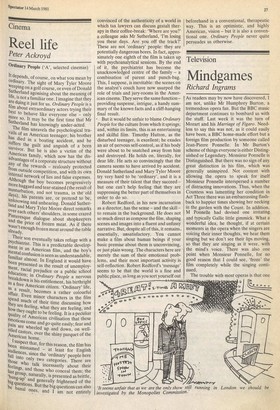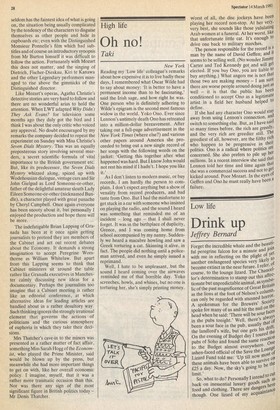Television
Mindgames
Richard Ingrams
As readers may by now have discovered, I am not, unlike Mr Humphrey Burton, a tremendous opera fan. But the BBC music department continues to bombard us with the stuff. Last week it was the turn of Mozart and his Marriage of Figaro. Needless to say this was not, as it could easily have been, a BBC home-made effort but a foreign film production by someone called Jean-Pierre Ponnelle. In Mr Burton's scheme of things everyone is either Distinguished or Legendary. Monsieur Ponnelle is Distinguished. But there was no sign of any great distinction in his film, which was generally uninspired. Not content with allowing the opera to speak for itself Monsieur Ponnelle interspersed a number of distracting innovations. Thus, when the Countess was lamenting her condition in Act Three there was an embarrassing flashback to happier times showing her necking in the garden with the Count. In addition, M Ponnelle had devised one irritating and typically Gallic little gimmick. What a wonderful idea, he thought, if at certain moments in the opera when the singers are • voicing their inner thoughts, we hear them singing but we don't see their lips moving, so that they are singing as it were, with the mind's voice. There was also one point when Monsieur Ponnelle, for no good reason that I could see, 'froze' the film completely while the singing continued.
The trouble with most operas is that one seldom has the faintest idea of what is going on, the situation being usually complicated by the tendency of the characters to disguise themselves as other people and hide in cupboards etc; even with the Distinguished Monsieur Ponnelle's film which had subtitles and of course an introductory synopsis from Mr Burton himself it was difficult to follow the action. Fortunately with Mozart this does not matter, and the singing of Dietrich, Fischer-Dieskau, Kin i te Kanawa and the other Legendary performers managed to rise above the gimmicks of the Distinguished director.
Like Mozart's operas, Agatha Christie's detective stories are very hard to follow and there are no wonderful arias to hold the attention. When LWT adapted Why Didn't They Ask Evans? for television some months ago they duly got the bird and I think I was about the only critic who voiced any approval. No doubt encouraged by my remarks the company decided to repeat the experiment on Sunday with Miss Christie's Seven Dials Mystery. This was an equally preposterous story involving several murders, a secret scientific formula of vital importance to the British government etc. But, like its predecessor, the Seven Dials Mystery whizzed along, spiced up with Wodehousian dialogue, vintage cars and Sir John Gielgud as Lord Someone-or-other, father of the delightful amateur sleuth Lady Eileen Someone-or-other (nicknamed Bundle), a character played with great panache by Cheryl Campbell. Once again everyone has been snooty about it, but personally I enjoyed the production and hope there will be more.
The indefatigable Brian Lapping of Granada has been at it once again getting journalists to pretend they are members of the Cabinet and act out recent debates about the Economy. It demands a strong imagination to accept Peregrine Wors thorne as William Whitelaw. But apart from this Lapping seems to think that Cabinet ministers sit around the table rather like Granada executives in Manchester calmly discussing new ideas for a documentary. Perhaps the journalists too imagine that a Cabinet meeting is rather like an editorial conference, at which alternative ideas for leading articles are bandied about in a rather desultory way. Such thinking ignores the strongly irrational element that governs the actions of politicians and the curious atmosphere of euphoria in which they take their decisions.
Mrs Thatcher's cave-in to the miners was presented as a rather matter of fact affair, something Miss Sarah Hogg of the Economist, who played the Prime Minister, said would be blown up by the press, but meanwhile she had more important things to get on with, like her overall economic policy. I imagine, myself, that it was a rather more traumatic occasion than this. Nor was there any sign of the most significant figure in British politics today — Mr Denis Thatcher.







































 Previous page
Previous page